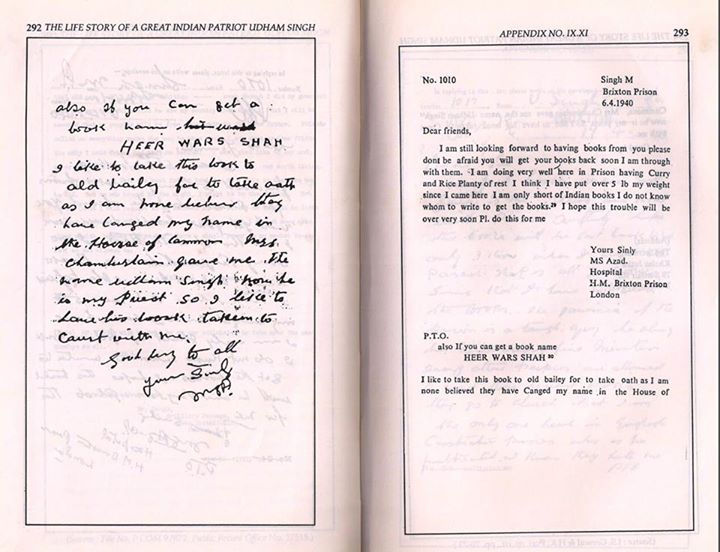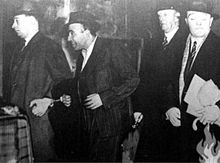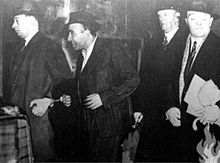Story: Kulveer Samra | Image: Vikrant Tv
It was 31st July 1940, exactly 75 years ago to this day, when a man called Ram Mohammad Singh Azad went to the gallows at Pentonville Prison, UK and was buried within the prison grounds. He had killed a British General in cold blood. And during his trial he had laughed at the judges and had refused to take oath on a holy book, choosing instead, a love story for the oath. His defence team pleaded to the judges that he was insane, but Azad denied it and insisted that he was sound of mind, and all this he did while laughing at the judges.
A very strange name for an Indian to have. Ram, Mohammed, Singh and Azad; all in one name! No one could guess either from his appearance or his name whether he was a Hindu, a Muslim or a Sikh. But you could tell he was an Indian, a Hindustani. From his words and his actions it was obvious that he might have had India in his soul when he dumped the name given to him by his orphanage, when he had dumped the clothes and the religious symbols that separated him from his countrymen.
Some people said he was a lunatic. Even Mahatma Gandhi said so. What kind of a person could keep such a funny name after dumping a name apt for his religious leanings. Would a sane person travel a thousand miles and wait for twenty years patiently to avenge the murder of thousands of his countrymen? Yet he did it, his own man, a lone wolf patiently biding his time and planning his move.
He had been in U.K. to avenge the murder of thousands of Hindustanis and was planning his moves carefully. With lots of effort he had finally got employment under the British General he held responsible for the crime. With time he had gained trust and became a trusted hand. Often he used to accompany the General on his hunting excursions as an able assistant. Finally, one day he had the General under the cross-hairs of his gun. He took careful aim and was about to pull the trigger. But he stopped. If he killed his employer, he wondered, no Britisher would ever trust a Hindustani for employment. Certainly he did’nt want to put all Hindustanis in U.K. at risk of un-employment. He drew back his gun and walked away, from the opportunity and from the employment.
He bided his time till another opportunity presented itself on 13 March 1940, as the General was scheduled to speak at a joint meeting of the East India Association and the Central Asian Society (now Royal Society for Asian Affairs) at Caxton Hall. The security protocol was air-tight, yet Azad got in somehow with his revolver concealed in a Bhagwad Geeta. As he slowly sauntered across the hall, and stood against the wall. The meeting went on for an hour and as the meeting concluded, Azad shot the General twice as he moved towards the speaking platform, killing him immediately. Azad did not attempt to flee and was arrested on site.
In a grainy pic from yore, you can see him smiling as he is led away to the gallows.
In press statements, Mahatma Gandhi condemned the 10 Caxton Hall shooting saying, “the outrage has caused me deep pain. I regard it as an act of insanity…I hope this will not be allowed to affect political judgement.”
In a trial that started on 1 April 1940, Azad was formally charged with the murder of the General. While awaiting trial in Brixton Prison, he went on a 42-day hunger strike and had to be forcibly fed. When asked about his motivation, he explained:
I did it because I had a grudge against him. He deserved it. He was the real culprit. He wanted to crush the spirit of my people, so I have crushed him. For full 21 years, I have been trying to wreak vengeance. I am happy that I have done the job. I am not scared of death. I am dying for my country. I have seen my people starving in India under the British rule. I have protested against this, it was my duty. What a greater honour could be bestowed on me than death for the sake of my motherland?
He was indeed a crazy man. When asked to chose a Holy Book for Oath he chose a love story by Waris Shah. The Heer.

He preferred to take oath on the copy of Punjabi classic poetry-Heer-Waris Shah! What more tribute a poet can dream of-a revolutionary and would be martyr taking oath on his book!
During the course of his trial he refused to take oath on any holy book and chose Waris Shah’s ‘Heer’ for the honour.
On 4 June 1940, his trial commenced at the Central Criminal Court, Old Bailey, before Justice Atkinson. He was convicted and sentenced to death. Even as he was led to the gallows, he refused to bow to any holy book.
He was hanged on 31st July 1940. But he died contended that Jalianwaala Bagh had been avenged, 21 years after it had happened. He had killed General O’Dwyer who was the Governor of Punjab in 1919 when Jalianwaala Massacre had happened. Over 3,000 Indians had died in that massacre, mercilessly killed by a barrage of bullets by a platoon of army sepoys led by Brigadier General Dyer who was then the commandant of Amritsar in Punjab. General O’Dwyer had praised Dyer for the attack and had commended him for his timely action against the brigand Indians.
He had been born as ‘Sher Singh’ and was brought to an orphanage at the age of 10 after the death of his father. His mother had died when he was just 3 years old. The orphanage named him ‘Uddham Singh’. Historians differ on many aspects related to his life. Some say he never used the name ‘Ram’, some say he did. The name Mohammed was dumped for all practical purposes by historians as they adopted the name Sardar Uddham Singh, as he is now known in Punjab. Seperatist websites of Sikhs glorify him but miss the soul of his beliefs. And as with most things related to Punjab, Rest of India has forgotten him, finding no mention in text-books. There is no memorial in his name and he is forgotten.
His remains were brought to India in 1974 and his last rites were conducted in his village 44 years after his death. But even that activity was limited to Punjab and was mostly a political drama.
But on his martyrdom day today, he must be remembered as just a Hindustani, a true Indian. An Indian with the true spirit of a secular India in him, bereft of all religious differences. If we can for just a few seconds discard our religious identity, we would do his memory some justice.
Written By Kulveer Singh Samra












